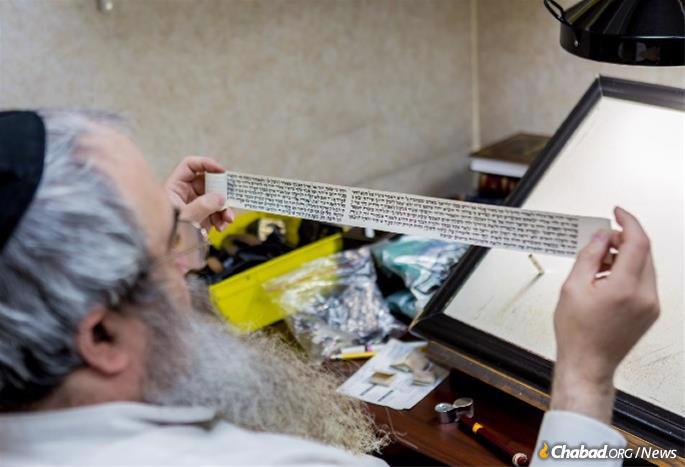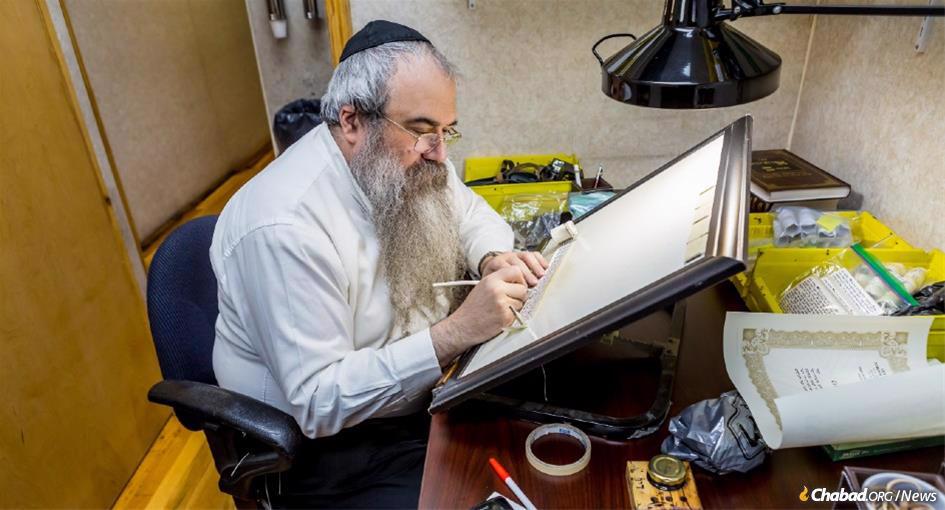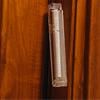In the hustle and bustle of life, it’s easy to get caught up in minutiae and marvel at how time passes much too quickly. But one of the beautiful things of the month of Elul is to consciously use time for reflection, introspection and preparation in advance of the “Days of Awe” between Rosh Hashanah and Yom Kippur.
One important action to take during Elul is to have mezuzahs and tefillin checked. Doing so means using a certified, experienced sofer (“scribe”), an expert in STaM: Sefer Torah, tefillin and mezuzah.
Scribe Rabbi Yosef Yitzchak (“Fitz”) Rabin explains that “according to the letter of the law, tefillin need not be checked unless an external issue appears, and mezuzahs need only be checked twice in seven years. But a proactive, diligent person should have both their tefillin and mezuzahs checked yearly during the month of Elul.”
“With the mitzvah of mezuzah,” says scribe Rabbi Yitzchok Raskin, “the intention is first and foremost to fulfill G‑d’s mitzvah of affixing kosher mezuzahs on the appropriate doors and gates of one’s home. In addition, there is an extra benefit for the household: G‑d’s protection of one’s home, belongings and the people who live there while in and outside the home.”
Rabin uses this analogy: “In order to sustain life, one doesn’t shop for food in a child’s play kitchen. We go to the grocery store to purchase it. What play food is to real food, an empty mezuzah case or a paper scroll or photocopied scroll is to the actual mezuzah scroll.” Fulfilling the mitzvah means understanding that the casing is only an ornament.
‘A Huge Responsibility’
“One must have a proper mezuzah written by a certified scribe, who is diligent, responsible, careful, knowledgeable and G‑d-fearing,” says Rabin. “It’s a huge responsibility, especially because the mitzvah elevates the physical into the spiritual world.”
Raskin offers this advice: “There are a lot of scribes and stores. Do not assume the mezuzah purchased with a casing or from a store is kosher. Know the scribe and his reputation before you purchase your tefillin and mezuzahs.”
In the Shema, it states that in order to fulfill the mitzvah of mezuzah, a scroll must be handwritten. But that isn’t enough. For a mezuzah to be kosher, a scribe must know and put into practice more than 700 laws involved with its writing. These include such details as the mindset and personal preparation of the scribe, the quill, black ink and parchment used, and how each letter must be written.

The parchment used must be fully processed hide from a kosher animal. It almost always is from a cow, but sheepskin or goatskin could be used. Rabin explains that the scribe ought to regularly immerse himself in mikvah, pray for success in his work and must verbally declare his intention prior to writing. Throughout the entire process, the scribe must be fully cognizant of the holy words he is writing; there may be no distractions. In fact, some wear earplugs to drown out exterior noise.
Mezuzahs, especially those affixed to the outside of a home, are subjected to all sorts of weather, such as humidity, rain, extreme temperatures and the sun—all of which can eventually make the parchment brittle or alter the letters by causing a cracking or fading of the ink. These issues often impact whether or not a mezuzah is indeed kosher.
For a Jew,” says Rabin, “Torah and mitzvahs are what help us access our connection with G‑d. They give us vitality and meaning to life. Tefillin and mezuzahs are an important part of that, and like any relationship one cherishes, give it your best attention.”
To find a certified scribe, contact your local Chabad center.









Start a Discussion